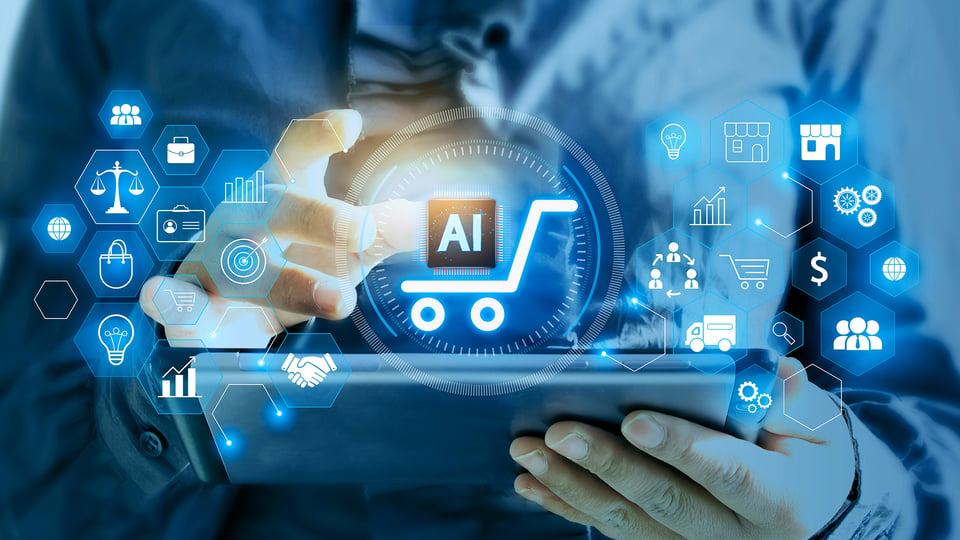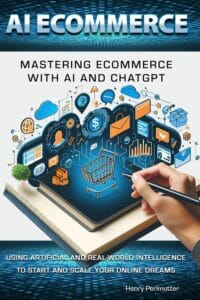
Introduction
The e-commerce industry has experienced significant changes for the last ten years – the way people shop and perceive brands. Perhaps one of the key developments that has been realized in the last couple of years has been the incorporation of AI in e-commerce sites. AI technology is enabling companies treat consumers as unique individuals which not only increases satisfaction that they receive but also the sales they make resulting in customer loyalty. As AI integrated search tools and algorithms help e commerce firms to identify consumer behavior, or customer needs, or specific targeting approach and / or message..
The use of AI in customizing one’s shopping experience online is not limited to product suggestions based on a browsing history. This remains a higher form of interaction with the customer, covering issues like preference, past purchase, search behavior, or even seasonality. In this article, we will also examine how e-commerce is being enhanced by artificial intelligence and how consumers could see an entirely new form of shopping that is also individualized.
what is e-commerce?
E-commerce, also known as ‘electronic commerce,’ is the acquisition or selling of goods and services through electronic techniques which eliminate the physical store-front factors. And it covers virtually all forms of buying from core tangible products like electronics to clothing to digital products such as software, e-books, and even subscriptions. Online shops include features of shopping from any point and at any time and the forms of payment, which can be credit cards, e-money or bank transfers. That availability has therefore made e-commerce an important aspect of modern society by transforming the way customers purchase products and the way firms conduct their activities. When it comes to classification of e-commerce models, there are several models that would help to assist the market needs. The most frequently used type of these selling models is B2C (Business to consumer), where businesses operate at providing consumer goods to other participants directly, for example, through online shops such as Amazon and Walmart. Business-to-business (often called B2Bs) are transactions that happen between two businesses, usually regarding the purchase of large products and services. Online direct selling where consumers sell their own products to another consumer is provided by C2C firms such as eBay or Poshmark. Finally, C2B or Consumer to Business is where the consumer has the opportunity to provide products or even services to the business for example through freelancing sites like Fiverr or up work. Electronic commerce systems have offered a new direction to international business by helping the business to penetrate through the global market and consumers to gain easier access to many products.

What is AI?
AI (Artificial Intelligence) is a branch and process of computer science that separates the human cognition ability and mimics this ability in machines. It comprises of designing methods or models through which computers can analyze data, identify patterns, decide, and learn on their own accord. AI can accomplish functions that are generally cognitive in nature including vision, speech, choice, and language translation. AI can be categorized into two main types: narrow AI and general AI. Narrow AI is implemented for a limited number of specific and adjacent functions, like voice assistants (Siri, Alexa), recommendation systems (for instance, Netflix, Amazon recommending you products based on previous behavior), or technologies that will let cars drive themselves (autonomous vehicle). It is for this reason that these systems are very efficient in their areas of jurisdiction but can be said to exhibit rather localized and segmented thinking. General AI is the another type of AI which refers to the technology that can do everything a human being is capable of doing. Although general AI still does not exist and is still in development, narrow AI is today implemented in almost all industries as a tool for improving performance, automating routine, and creating new solutions in healthcare, finances, trade, and transport.
How AI is revolutionizing the e-commerce personalization process is made easy.
1. Personalized Product Recommendations: Through this, the AI has changed how businesses date recommend products to consumers. Through the application of machine learning, AI is able to study a client’s web-based shopping and purchasing patterns and make appropriate recommendations regarding other products which may interest him or her. Various websites like Amazon use AI to recommend goods and services, personalized to each customer, the individual’s past activity, and similar users. This flaovoured sysyem for an automated product recommendation increases customers’ conversion rates as offers adequately correspond which products the customer may buy.
2. Dynamic Pricing Strategies: AI is also used in the setting of what is called dynamic pricing, whereby companies will change the price on their products often based on such factors like demand, the prices offered by competitors, and the manner in which relevant customers are likely to behave. For instance, if a certain item is favored by many users but has few buys, then, AI will reduce the rate with which the item is sold. On the other hand AI can increase the price of a product if for instance it is selling fast within the market. It is thus evident that this adaptive mean of formulation of the price makes it easy for business organizations to be competitive and to maximize market revenues.
3. Chatbots and Virtual Assistants: Smart and Virtual assistants are improving customer experience in e-commerce. The given tools offer immediate round-the-clock help regarding the different aspects of products and orders, as well as returns. In addition the more complex artificial intelligence applications such as NLP mean that chatbots themselves can better understand queries from customers and hence provide more accurate answers. Since the assistance provided is unique for every user, customers are best placed when they utilize these intelligent tools while purchasing products hence enhance customer satisfaction.
4. Predictive Analytics for Inventory Management: AI is now changing the ways that firms conduct their stock through the use of predictive analytics. Through analyzing customer buying habits, seasons, and environmental factors, AI is in a position to identify which products are likely going to be popular at any one time. This makes it easy for businesses to stock their inventories and minimize on cases where they stock too much or too little. Predictive analytics also find use in making sales forecasts, in improving supply chain performance and customer satisfaction due to effectiveness in stock holding.
5. Personalized Marketing Campaigns: AI is also proving to be very useful in e-commerce marketing by way of highly specific marketing. , AI tools can classify audiences with metrics based on Demographics, behavior and interests from customer data. This makes it possible for the business to send out personalized email messages, special offers and promotions to some groups of people hence increasing the possibility of the targets being met. AI assistance can also cater content relevant to a given clerk, customer or user as well as offering products based on a website users’ history.
6. Voice Search and AI Integration: Expanded volumes of voice search results from frequently used virtual digital assistants, such as Amazon’s Alexa, Google Assistant and Apple’s Siri, among others, has made this factor relevant to e-commerce. AI enables voice search to work by providing flawless voice recognition, which enables customers to navigate and purchase products easily. Also, voice shopping implies that the consumers can shop with their hands busy, which is not a disadvantage since it will positively advance the shopping experience as it will be easy, convenient and very much tailored to meet the needs of the customers.
Advantages of Personalization through AI: A Focus on E-commerce Retailing
1. Improved Customer Experience: Erasing the separation between sellers and customers helps the latter to better identify with the overall flow, which in turn raises satisfaction. By recommending various products based on the purchases made by the customer, hence making shopping fun and easy. Therefore, adoption of customer relationship management enables e-commerce to provide customized service delivery; hence, customers are bound to repeat the purchase with a particular platform.
2. Higher Conversion Rates and Sales: AI has also been noted to improve personalization and has been determined to have a high impact on conversion rate. AI creates more buying choices by informing the right customer about a product at the right time. Due to this, AI can predict the customers’ needs and preference, and present to the customers, option which increases the chances of a purchase.
3. Enhanced Customer Loyalty: The rationale for these findings originate in the social psychological theory that suggests that when customers are provided with tailored communications, they are more likely to be loyal to the brand. This makes customers develop an inclination to associate with the company since they feel they are understood by AI. Other benefits include use of rewards and discounts, as well as follow-ups from the same business that a customer has interacted with in the past.
4. Operational Efficiency: This is not only good for the customer but also makes substantial impact on the business optimization. Some of the areas that AI finds solution in most firms include customer support, inventory management and data analysis, hence reducing cost and bearing more capacity. E-commerce business organizations can also be better positioned, manage their resources better and concentrate more on their major strategic development activities.
AI Issues in Personalization Scope and Issues of AI for Personalization
Nevertheless, the achieved results show that AI plays a crucial role in e-commerce personalization, which are still problematic for businesses. Data privacy and security is one of the big challenges to implementing big data solutions. AI systems need vast amounts of customers’ data from which to learn, and this creates questions and doubts as to how these businesses get, keep, and exploit such data. It is very important that clauses related to data privacy are implemented and that customer data is properly safeguarded.
Still, there is one more difficulty, namely, the high costs of the AI integration process and the number of difficulties connected with it. Small businesses, in particular, can face the problem where the acquisition of AI-based tools and platforms may cost a fair amount. Furthermore, AI as a component that should be integrated into the existing structures may take a lot of time and resources, which can be a problem for those e-commerce players that are not giants of the market.
Conclusion
Implementing artificial intelligence is slowly but surely revolutionizing many aspects of e-commerce, giving companies more ways and means for engaging their clientele in a highly individualized manner. As simple as product suggestions to as complex as price-piece offers and future trends, AI is making businesses critical and customer-friendly. With an active progression in technology, it is possible to regard the improvement of such solutions and more effective functioning of online shopping in the future.
The e-commerce platforms that integrate the use of AI in personalization stand to benefit from not only higher conversion rates, improved customer loyalty coupled with increased sales, but also a more enhanced and efficient value chain. Yet, the main issues come in the form of data privacy and the cost of implementation of measures by the businesses. Therefore, over time, e-commerce will be shaped by AI through evoking social, valuable, and convenient shopping experiences that consumers desire to shop more.




I’m extremely impressed together with your writing skills as well as with the layout on your weblog.
Is that this a paid subject or did you customize it your self?
Anyway stay up the excellent quality writing, it’s rare to see a
great weblog like this one today. Beacons AI!